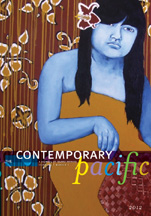About the Artist: Andy Leleisi‘uao, vii
ARTICLES
‘I Hē Koe? Placing Rapa Nui
Forrest Wade Young, 1
Abstract: In August 2010, conflict between indigenous Rapa Nui people and the Chilean state in “Easter Island” escalated as Rapa Nui occupied institutions and lands claimed by the Chilean state. This article introduces competing discourses by which the events of August 2010, as well as subsequent conflicts, might be assessed: archaeological, tourist, Chilean, indigenous, and cosmopolitan ethnography. Ethnographic analysis illuminates the point that the nonindigenous discourses fail to coherently “place” the significance of Rapa Nui people in Easter Island and hence cannot coherently ground the sense of Rapa Nui resistance. By contextualizing the events within indigenous epistemology, the events are shown to be continuous with over a century of rational Rapa Nui resistance to Chilean colonialism on the island. The article thus provides a discursive ground for interpreting recent and ongoing conflict in Rapa Nui in terms of Rapa Nui discursive practice.
Keywords: Easter Island, Rapa Nui, indigenous epistemology, colonialism, resistance
Development and Negative Constructions of Ethnic Identity: Responses to Asian Fisheries Investment in the Pacific
Kate Barclay, 33
Abstract: This article explores ethnic identities in representations of tuna fishing and canning companies in Solomon Islands and Papua New Guinea. One point raised by the analysis is that while national identities in these countries are often disrupted by subnational ethnic identities, strong nationalist discourses pervade representations of these companies. The nationalism apparent in responses to these companies is negative, reacting against perceived exploitation by foreigners through narratives of corporate wrongdoing. This article investigates the significance of this style of identification and questions whether the national identities entailed in negative representations of foreign investment constitute resistance against development or a disempowering victim identification that reifies a subordinate position in the world political economy.
Keywords: nationalism, development, postdevelopment, fisheries, Solomon Islands, Papua New Guinea
Choreographing Difference: The (Body) Politics of Banaban Dance
Katerina Martina Teaiwa, 65
Abstract: This article discusses Banaban choreography as an expression of historical and postcolonial identities and, more specifically, relations between Banabans and I-Kiribati in terms of what I understand as the Banaban production of difference through dance. This process is shaped by a strategic approach to representing and reconstructing the past and kinship. I explore some of the tensions around history, kinship, and performance that resulted from the impact of phosphate mining and eventual displacement of Banabans from the Gilbert and Ellice Islands Colony (now Kiribati and Tuvalu) to Rabi in Fiji. I also discuss how this research opens up possibilities for a more corporeal approach to Pacific studies.
Keywords: Banaba, Kiribati, Rabi, history, dance, body, identity
DIALOGUE
“Vot Long Stret Man”: Personality, Policy, and the Election of Ralph Regenvanu, Vanuatu 2008
Benedicta Rousseau, 98
Abstract: This dialogue piece provides an ethnographic account of the 2008 election campaign in Port Vila, Vanuatu. Focusing on the seemingly exceptional campaign and victory of Ralph Regenvanu, it is argued that current analytical perspectives on “Melanesian-style” politics misplace the role of culture in political activity in Vanuatu, treating it as a hindrance to the realization of an implicit ideal of “acultural” parliamentary politics. This serves to both dehistoricize and decontextualize the electoral participation of ni-Vanuatu. It is argued that ethnographic investigation of election campaigning produces a more nuanced picture of both continuous and novel aspects of political engagement. Particular attention is given to the production of policy over time, and the ways in which leadership is manifested and judged in the context of elections. This allows us to understand Ralph’s success as embedded within ongoing civil society politics in Vanuatu and dependent on public discourses regarding the legitimacy of leadership, rather than viewing it as an anomalous victory over “culture.”
Keywords: Vanuatu, Ralph Regenvanu, elections, leadership, electoral participation, campaigning, culture
“We Were Still Papuans:” A 2006 Interview with Epeli Hau‘ofa
Nicholas Thomas, 120
POLITICAL REVIEWS
Micronesia in Review: Issues and Events, 1 July 2010 to 30 June 2011
John R Haglelgam, David W Kupferman, Kelly G Marsh, Samuel F McPhetres, Donald R Shuster, Tyrone J Taitano, 136
Polynesia in Review: Issues and Events, 1 July 2010 to 30 June 2011
Lorenz Gonschor, Hapakuke Pierre Leleivai, Margaret Mutu, Forrest Wade Young, 172
BOOK AND MEDIA REVIEWS
Tahiti: Regards intérieurs, edited by Elise Huffer and Bruno Saura; Images et pouvoirs dans le Pacifique, edited by Viviane Fayaud and Jean-Marc Regnault; Tahiti Beloved and Forbidden: Tahiti Herehia, Tahiti Rahuia, by Marie Claude Teissier-Landgraf
Reviewed by Alexander Mawyer, 210
This IS Hawai‘i [exhibition]
Reviewed by A Marata Tamaira, 214
The Statues That Walked: Unraveling the Mystery of Easter Island, by Terry Hunt and Carl Lipo
Reviewed by Julie S Field, 219
The Other Side: Ways of Being and Place in Vanuatu, by John Patrick Taylor
Reviewed by Lisa Humphrey, 221
The Day the Sun Rose in the West: Bikini, the Lucky Dragon, and I, by Ōishi Matashichi
Reviewed by Holly M Barker, 223
On the Edge of the Global: Modern Anxieties in a Pacific Island Nation, by Niko Besnier
Reviewed by Cluny Macpherson, 226
Contributors
229





